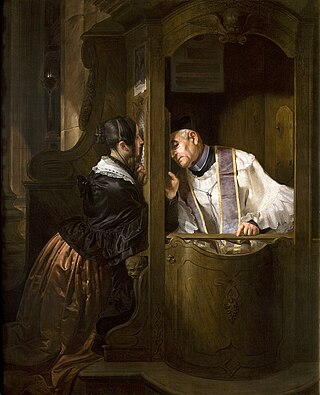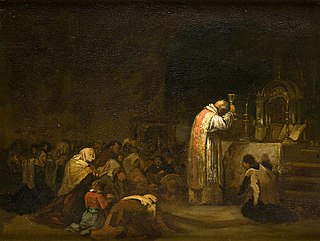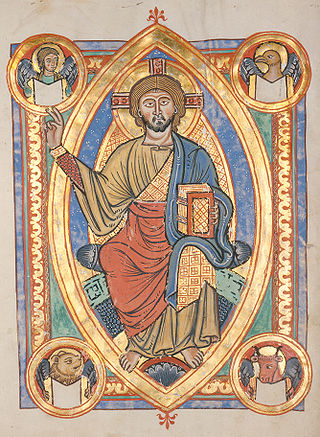Related Research Articles

In Catholic theology, Limbo is the afterlife condition of those who die in original sin without being assigned to the Hell of the Damned. Medieval theologians of Western Europe described the underworld as divided into three distinct parts: Hell of the Damned, Limbo of the Fathers or Patriarchs, and Limbo of the Infants. The Limbo of the Fathers is an official doctrine of the Catholic Church, but the Limbo of the Infants is not. The concept of Limbo comes from the idea that, in the case of Limbo of the Fathers, good people were not able to achieve heaven just because they were born before the birth of Jesus Christ. This is also true for Limbo of the Infants in that simply because a child died before baptism, does not mean they deserve punishment, though they cannot achieve salvation.
Justificatio sola fide, meaning justification by faith alone, is a soteriological doctrine in Christian theology commonly held to distinguish the Lutheran and Reformed traditions of Protestantism, among others, from the Catholic, Eastern Orthodox, Oriental Orthodox, Assyrian and Anabaptist churches. The doctrine asserts that it is on the basis of faith alone that believers are made right of sin ; and not on the basis of what Paul the Apostle calls "works of the law", which sola fide proponents interpret as including not only moral, legal or ceremonial requirements but any good works or "works of charity."

Sacrifice is the offering of material possessions or the lives of animals or humans to a deity as an act of propitiation or worship. Evidence of ritual animal sacrifice has been seen at least since ancient Hebrews and Greeks, and possibly existed before that. Evidence of ritual human sacrifice can also be found back to at least pre-Columbian civilizations of Mesoamerica as well as in European civilizations. Varieties of ritual non-human sacrifices are practiced by numerous religions today.

Mortification of the flesh is an act by which an individual or group seeks to mortify or deaden their sinful nature, as a part of the process of sanctification.

Penance is any act or a set of actions done out of repentance for sins committed, as well as an alternate name for the Catholic, Lutheran, Eastern Orthodox, and Oriental Orthodox sacrament of Reconciliation or Confession. It also plays a part in confession among Anglicans and Methodists, in which it is a rite, as well as among other Protestants.

In Christianity, salvation is the saving of human beings from sin and its consequences—which include death and separation from God—by Christ's death and resurrection, and the justification entailed by this salvation.
Ascetical theology is the organized study or presentation of spiritual teachings found in Christian Scripture and the Church Fathers that help the faithful to more perfectly follow Christ and attain to Christian perfection. Christian asceticism is commonly thought to imply self-denial for a spiritual purpose. The term ascetical theology is used primarily in Roman Catholic theology; Eastern Orthodox theology carries its own distinct terms and definitions, and other religious traditions conceive of following and conforming to God and Christ differently from either Orthodoxy or Catholicism.
In Christian hamartiology, eternal sin, the unforgivable sin, unpardonable sin, or ultimate sin is the sin which will not be forgiven by God. One eternal or unforgivable sin, also known as the sin unto death, is specified in several passages of the Synoptic Gospels, including Mark 3:28–29, Matthew 12:31–32, and Luke 12:10, as well as other New Testament passages including Hebrews 6:4–6, Hebrews 10:26–31, and 1 John 5:16.

Absolution is a theological term for the forgiveness imparted by ordained Christian priests and experienced by Christian penitents. It is a universal feature of the historic churches of Christendom, although the theology and the practice of absolution vary between Christian denominations.
The Paschal mystery is one of the central concepts of Catholic theology relating to the history of salvation. According to the Compendium of the Catechism of the Catholic Church, "The Paschal Mystery of Jesus, which comprises his passion, death, resurrection, and glorification, stands at the center of the Christian faith because God's saving plan was accomplished once for all by the redemptive death of himself as Jesus Christ." The Catechism states that in the liturgy of the Church "it is principally his own Paschal mystery that Christ signifies and makes present."

Eucharist is the name that Catholic Christians give to the sacrament by which, according to their belief, the body and blood of Christ are present in the bread and wine consecrated during the Catholic eucharistic liturgy, generally known as the Mass. The definition of the Eucharist in the 1983 Code of Canon Law as the sacrament where Christ himself "is contained, offered, and received" points to the three aspects of the Eucharist according to Catholic theology: the real presence of Christ in the Eucharist, Holy Communion, and the holy sacrifice of the Mass.

In Christian theology, Hell is the place or state into which, by God's definitive judgment, unrepentant sinners pass in the general judgment, or, as some Christians believe, immediately after death. Its character is inferred from teaching in the biblical texts, some of which, interpreted literally, have given rise to the popular idea of Hell. Theologians today generally see Hell as the logical consequence of rejecting union with God and with God's justice and mercy.

Pro multis is a Latin phrase that means "for many" or "for the many". Not having the definite article, Latin does not distinguish between these two meanings.
The treasury of merit or treasury of the Church consists, according to Catholic belief, of the merits of Jesus Christ and his faithful, a treasury that because of the communion of saints benefits others too. According to the Westminster Dictionary of Theological Terms, this Catholic belief is a way of expressing the view that the good works done by Jesus and others can benefit other people, and "contemporary Roman Catholic theologians see it as a metaphor for ways in which the faith of Christ and the saints helps others".

The traditional prayer in honor of the shoulder wound of Jesus calls to mind the wound that Jesus is said to have received carrying the cross on which he was crucified. It is variously attributed to Saint Bernard of Clairvaux or to Saint Gertrude or Saint Mechtilde.
Catholic theology is the understanding of Catholic doctrine or teachings, and results from the studies of theologians. It is based on canonical scripture, and sacred tradition, as interpreted authoritatively by the magisterium of the Catholic Church. This article serves as an introduction to various topics in Catholic theology, with links to where fuller coverage is found.
The concept of a victim soul is an unofficial belief derived from interpretations of the Catholic Church teachings on redemptive suffering. A person believes themselves or is considered by others to be chosen by God to suffer more than most, accepting this condition based on the example of Christ's own Passion. Neither the Catholic Church, nor any other Christian denomination, officially designates anyone as a victim soul. As it is not considered dogma, the Church classifies belief in victim souls as a matter of private revelation and thus not obligatory for members to subscribe to.
The Roman Catholic Church has often held mortification of the flesh, as a worthy spiritual discipline. The practice is rooted in the Bible: in the asceticism of the Old and New Testament saints, and in its theology, such as the remark by Saint Paul, in his Epistle to the Romans, where he states: "If you live a life of nature, you are marked out for death; if you mortify the ways of nature through the power of the Spirit, you will have life.". It is intimately connected with Christ's complete sacrifice of himself on the Cross: "those who belong to Christ have crucified nature, with all its passions, all its impulses". Christ himself enjoined his disciples to mortify themselves when he said: "If any man would come after me, let him deny himself and take up his cross and follow me". According to the Catechism of the Catholic Church, "[t]he way of perfection passes by way of the Cross. There is no holiness without renunciation and spiritual battle. Spiritual progress entails the ascesis and mortification that gradually lead to living in the peace and joy of the Beatitudes: ‘He who climbs never stops going from beginning to beginning, through beginnings that have no end. He never stops desiring what he already knows.’". The purpose of mortification is to train "the soul to virtuous and holy living". It achieves this through conforming one's passions to reason and faith. According to the Catholic Encyclopedia, internal mortification, such as the struggle against pride and self-love, is essential, but external mortification, such as fasting can also be good if they conform with a spirit of internal mortification.
Repentance is a stage in Christian salvation where the believer acknowledges and turns away from sin. As a distinct stage in the ordo salutis its position is disputed, with some theological traditions arguing it occurs prior to faith and the Reformed theological tradition arguing it occurs after faith. In Catholic theology, Lutheran theology, Orthodox theology and Anglican theology, repentance plays a key role in Confession and Absolution.
Salvifici doloris is a February 1984 Apostolic letter by Pope John Paul II. Its theme was suffering in general in the light of the cross and salvific or redemptive suffering in particular. It was issued in connection with the 1983 Holy Jubilee Year of Redemption.
References
- 1 2 Lebacqz, Karen (29 August 2014). "Redemptive Suffering Redeemed:". Suffering and Bioethics: 262–274. doi:10.1093/acprof:oso/9780199926176.003.0013.
- ↑ National Catholic Register, quoting Salvifici Doloris
- ↑ Catechism of the Catholic Church. p. Paragraph 1505. Retrieved 9 January 2021.
- ↑ The Last Conversations and Confidences of Saint Therese of the Child Jesus. Neumann Press. pp. 133–134. ISBN 0-911845-72-0 . Retrieved 9 January 2021.
- ↑ "Padre Pio Quotes About Suffering". Vatican Site. Retrieved 9 January 2021.